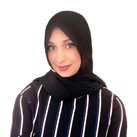I was the first reporter to wear a hijab on Scottish news. It shows how much diversity is still needed
I was once asked by someone in the industry whether I would consider removing my hijab if I wanted to progress in my career and that I had all the 'skills and potential' but didn’t really have the right 'look' for TV

Your support helps us to tell the story
From reproductive rights to climate change to Big Tech, The Independent is on the ground when the story is developing. Whether it's investigating the financials of Elon Musk's pro-Trump PAC or producing our latest documentary, 'The A Word', which shines a light on the American women fighting for reproductive rights, we know how important it is to parse out the facts from the messaging.
At such a critical moment in US history, we need reporters on the ground. Your donation allows us to keep sending journalists to speak to both sides of the story.
The Independent is trusted by Americans across the entire political spectrum. And unlike many other quality news outlets, we choose not to lock Americans out of our reporting and analysis with paywalls. We believe quality journalism should be available to everyone, paid for by those who can afford it.
Your support makes all the difference.Last month, I was able to break through a glass ceiling that I felt had cast a shadow over me for so long – when I, a woman wearing a hijab, did my first TV report for STV news in Scotland. It was a massive step for me, yet there is so much more that needs to be done for better representation in the UK media.
Currently in Scotland, there is a real lack of representation from black and Asian ethnic minority media professionals on screen. In fact, my TV report was deemed to have been the first time a hijab-wearing TV reporter anchored a news report in Scotland. I faced many challenges and barriers over the years trying to transition into broadcast journalism.
I was once asked by someone in the industry whether I would consider removing my hijab if I wanted to progress in my career and that I had all the “skills and potential” but didn’t really have the right “look” for TV. I refused to compromise my identity as Muslim woman just to get ahead. I would have rather given up my ambition than give up on my beliefs, but felt that no one should have to be in a situation where they are discriminated against or not given a chance to progress purely based on the way they look.
I was at a point where I thought that I would never be able to get past this glass ceiling, but I was encouraged by my family to keep on trying. I then approached STV News with a story and they were fantastic, taking me on based solely on the story I wanted to highlight and the ability to do the job.
My identity played no role and this should be the norm for other organisations to follow suit. I don’t know what the future holds for me, but I do want to see change that makes things easier for people like me to be given equal opportunities within the media landscape.
Since sharing my experience, I have been contacted by many people in the media industry all over the UK and even globally telling me about their own challenges and experiences, including racism and discrimination. Sadly, many of those who contacted me are scared about sharing what has happened in case they are reprimanded, dismissed or they somehow jeopardise all the hard work they have done to get to where they are.
Notable public figures such as Sir Lenny Henry have been pioneering for diversity in TV for years and since then many mainstream broadcasters have pledged to improve their on-screen representation. Journalist Afua Hirsch has long called for genuine change in representation in the media and it’s exactly this that we are still waiting to see. When we see a hijab-wearing TV reporter, a black or Asian presenter as the norm, this is when we can truly say real change is being made.
Whilst there are some media organisations that are working hard to improve representation, there needs to be actionable steps taken to ensure real change. Those working in the media or trying to get into it should not be held back because of issues to do with race, faith, gender, disability or any other factor. I have started a campaign for better representation and diversity in the UK media and am calling on media organisations to work towards measures that can facilitate the much-needed change the industry so desperately needs.

Join our commenting forum
Join thought-provoking conversations, follow other Independent readers and see their replies
Comments